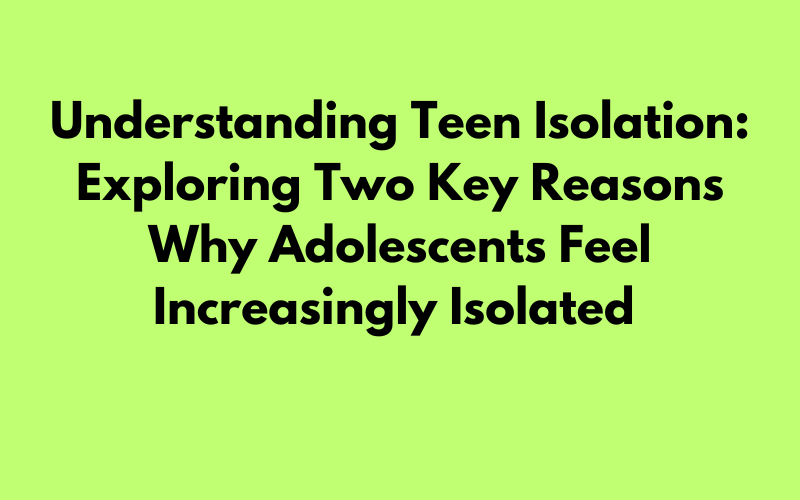During the tumultuous phase of adolescence, teenagers often experience a wide range of emotions and challenges. One prevalent issue faced by many teens is a growing sense of isolation. In this article, we will delve into the reasons behind this phenomenon, highlighting two significant factors that contribute to the increasing isolation felt by teenagers. By understanding these factors, we can pave the way for effective interventions like teen residential treatment and support systems to help teens navigate this challenging period of their lives.
The Impact of Technological Advancements on Teen Socialization:
In today’s digital age, technology plays an increasingly prominent role in the lives of teenagers. While it offers numerous benefits and opportunities for connection, it also presents unique challenges. One of the primary reasons teens feel more isolated during adolescence is the excessive use of technology, including social media platforms.
a) Social Media and Shallow Connections:
With the rise of social media, teenagers are more connected than ever before. However, this interconnectedness often comes at the expense of genuine and deep connections. Many teens find themselves trapped in a virtual world where online interactions replace meaningful face-to-face relationships. The constant comparison and pressure to maintain an online persona can lead to feelings of inadequacy, social anxiety, and isolation.
b) Cyberbullying and Online Harassment:
The digital landscape also exposes teenagers to the dark side of technology. Cyberbullying and online harassment have become distressingly common, causing significant emotional distress among adolescents. The fear of judgment, humiliation, and constant scrutiny can drive teens to withdraw from social interactions, resulting in increased feelings of isolation and loneliness.
Changing Social Dynamics and Peer Pressure:
Adolescence is a time when teenagers actively seek validation and acceptance from their peers. However, shifting social dynamics and the influence of peer pressure can exacerbate feelings of isolation during this crucial developmental phase.
a) Identity Formation and Peer Acceptance:
Teenagers often face the daunting task of self-discovery and identity formation. As they strive to fit in and be accepted by their peers, they may feel pressured to conform to societal expectations, compromising their authentic selves. This struggle to find acceptance can lead to a sense of isolation, as teenagers fear judgment and rejection if they deviate from the norm.
b) Cliques and Social Exclusion:
Adolescence is notorious for the formation of cliques and the exclusion of certain individuals. Teens who do not conform to the prevailing social norms or fail to find a sense of belonging within established groups may experience social exclusion. This exclusion can leave them feeling isolated and disconnected from their peers, contributing to a heightened sense of loneliness and isolation.
Conclusion:
Teen isolation during adolescence is a complex issue influenced by various factors. This article has explored two significant reasons why teenagers feel increasingly isolated: the impact of technological advancements and changing social dynamics. Recognizing these factors enables us to develop strategies to support teenagers effectively, fostering meaningful connections and helping them navigate this challenging phase of their lives. By addressing these issues head-on, we can create a more inclusive and supportive environment for adolescents, promoting their emotional well-being and overall development.The emphasis on teen mental health treatment is a crucial step in this process. It ensures their holistic development and growth.
Frequently Asked Questions
Why do teens feel more and more isolated during adolescence?
Teens may experience increased feelings of isolation during adolescence due to various reasons. Two key factors contributing to this isolation are the development of their identity and the influence of social media.
How does the development of identity contribute to teen isolation during adolescence?
Adolescence is a period of self-discovery and identity formation. As teens go through physical, emotional, and cognitive changes, they often grapple with questions about their identity. This search for identity can lead to feelings of isolation as they try to understand themselves and find their place in the world.
How does social media influence teen isolation during adolescence?
Social media can exacerbate feelings of isolation among teenagers. While it offers connectivity, it can also create unrealistic expectations and amplify social comparisons. Teens may feel left out or excluded when they see others appearing to have more friends, exciting experiences, or a seemingly perfect life, leading to increased feelings of isolation.
Are there other reasons apart from identity development and social media that contribute to teen isolation during adolescence?
Yes, there are additional factors that can contribute to teen isolation during adolescence. These may include academic pressures, bullying, changes in family dynamics, mental health issues, and a lack of supportive social networks.
How can identity development contribute to teen isolation during adolescence?
The process of identity development involves questioning and exploring one’s values, beliefs, and interests. This self-exploration can make teens feel misunderstood or disconnected from their peers or even their family members who may have different perspectives, leading to a sense of isolation.
How can social media impact teens’ sense of isolation during adolescence?
Social media can create a virtual environment that places importance on popularity, appearance, and social validation. This emphasis can intensify feelings of loneliness, inadequacy, or exclusion when teens perceive themselves as not meeting the standards set by their peers or online influencers.
Can peer pressure contribute to teen isolation during adolescence?
Yes, peer pressure can play a significant role in teen isolation. When teenagers feel pressured to conform to certain social norms or engage in activities they are not comfortable with, they may choose to isolate themselves to avoid these situations, leading to feelings of loneliness.
How can parents and educators help address teen isolation during adolescence?
Parents and educators can support teens by creating a safe and open environment for communication, fostering healthy relationships, and promoting social engagement. Encouraging offline interactions, providing guidance on responsible social media use, and addressing mental health concerns promptly can also help mitigate the feelings of isolation experienced by teenagers
